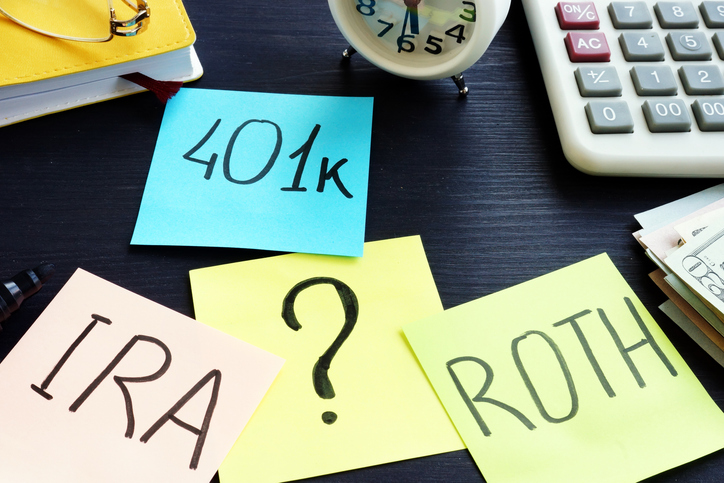

A Roth individual retirement account can allow you to save for retirement while enjoying some tax benefits. Getting divorced can affect your savings strategy if you plan to withdraw some of your IRA money or you’re transferring money from it to your former spouse. It’s important to understand how the Roth IRA 5-year rule might affect you if you’re soon to be divorced. You may benefit from speaking with a financial advisor who might be able to help you create a financial plan in preparation for the future.
The Roth IRA 5-Year Rule is an IRS rule that’s used to define qualified—and therefore, tax-free—distributions from a Roth account. Specifically, this rule says that withdrawals from a Roth IRA only count as qualified distributions if at least five years have passed since you first opened and made a contribution to your account.
The 5-year rule does not dictate when a distribution is also subject to early withdrawal penalties. Generally, an IRA owner is subject to a 10% early withdrawal penalty if they take money from their account before age 59 ½. The IRS does, however, allow some exceptions to this rule.
The clock for the 5-year rule starts ticking on the first day of the tax year that you made a contribution to your Roth IRA. During this five-year period, you can still withdraw your original contributions to a Roth IRA without triggering any tax. But any withdrawals of earnings would be subject to income tax at your regular tax rate.
It’s important to be up-to-date with the knowledge of how a divorce might impact any Roth IRA rules you must follow, regardless of your personal situation. Luckily, getting divorced doesn’t necessarily affect your Roth IRA unless one of two things is true:
Roth IRA assets that are considered to be a marital property can be divided in divorce following the property division laws of the state in which you live. If you and your spouse reside in a community property state, for example, then a court could order you to divide IRA assets 50-50. If you live in an equitable distribution state, on the other hand, the court could order a division that’s fair to both spouses.
What matters here is how tax liability transfers with the movement of IRA assets. If you have a Roth IRA and you’re transferring some of that money to your spouse as part of a divorce agreement, then generally, the tax benefits of that IRA should transfer as well. So that means your former spouse would be able to make qualified withdrawals from the account tax-free once they’ve moved it to their own IRA.
That also means, however, that the five-year rule would still apply. The IRS doesn’t explicitly specify how Roth IRA 5-year rules are handled in a divorce. But it does state that if someone inherits a Roth IRA, the five-year window includes the time the original owner held the account. So it makes sense that you could assume the same guideline applies to Roth IRA transfers in divorce.
You may, however, want to seek out the advice of a tax expert to confirm that no penalties will apply if you’re transferring Roth IRA assets or receiving them as part of a divorce settlement. It’s also a good idea to consult a tax pro or your financial advisor if you plan to take money from a Roth IRA following a divorce proceeding.

It’s possible that you may need to take money from your Roth IRA early. For example, you may need cash to pay your attorney’s fees, clear up debts or rent a new place to live. In that case, the 5-year rule would apply and you could be subject to income tax on distributions if your account’s been open less than five years. Depending on your age, the early withdrawal penalty might also kick in.
However, you could avoid the 10% early withdrawal penalty if any of these exceptions apply:
Exceptions are also allowed for qualified reservist distributions, qualified birth or adoption expenses or as the result of an IRS levy. If you’re taking money out for higher education expenses, you should plan to make payment directly to the school to avoid any potential tax penalties.
Once a divorce is finalized, you can continue making contributions to your Roth IRA as long as you have earned income. Keep in mind, however, that income is the main deciding factor in who can contribute to a Roth IRA.
For 2022, you’re eligible to make a full contribution to a Roth IRA as a single filer if your modified adjusted gross income is less than $129,000. A full contribution is $6,000 or $7,000 if you’re age 50 or older. Your ability to contribute to a Roth IRA phases out completely if your modified AGI is $144,000 or higher.
That could pose a problem for you if you were the higher earner in your marriage. Separate modified AGI limits apply for married couples who file joint tax returns. So if you made more than your spouse, that could affect how much, if anything, you could save in a Roth IRA following a divorce.

The Roth IRA divorce 5-year rule can seem confusing but the most important thing to understand is when the account was opened. As long as five years have passed since the first contribution, you should be able to withdraw original contributions and earnings with no income tax liability. Just keep in mind that the 10% early withdrawal penalty may still apply.
Photo credit: ©iStock.com/Inside Creative House, ©iStock.com/PeopleImages, © iStock.com/Prostock-Studio
Rebecca Lake, CEPF®Rebecca Lake is a retirement, investing and estate planning expert who has been writing about personal finance for a decade. Her expertise in the finance niche also extends to home buying, credit cards, banking and small business. She's worked directly with several major financial and insurance brands, including Citibank, Discover and AIG and her writing has appeared online at U.S. News and World Report, CreditCards.com and Investopedia. Rebecca is a graduate of the University of South Carolina and she also attended Charleston Southern University as a graduate student. Originally from central Virginia, she now lives on the North Carolina coast along with her two children. Rebecca also holds the Certified Educator in Personal Finance (CEPF®) designation.
Read More About Retirement



More from SmartAsset
SmartAsset Advisors, LLC ("SmartAsset"), a wholly owned subsidiary of Financial Insight Technology, is registered with the U.S. Securities and Exchange Commission as an investment adviser. SmartAsset's services are limited to referring users to third party advisers registered or chartered as fiduciaries ("Adviser(s)") with a regulatory body in the United States that have elected to participate in our matching platform based on information gathered from users through our online questionnaire. SmartAsset receives compensation from Advisers for our services. SmartAsset does not review the ongoing performance of any Adviser, participate in the management of any user's account by an Adviser or provide advice regarding specific investments.
We do not manage client funds or hold custody of assets, we help users connect with relevant financial advisors.
This is not an offer to buy or sell any security or interest. All investing involves risk, including loss of principal. Working with an adviser may come with potential downsides such as payment of fees (which will reduce returns). There are no guarantees that working with an adviser will yield positive returns. The existence of a fiduciary duty does not prevent the rise of potential conflicts of interest.